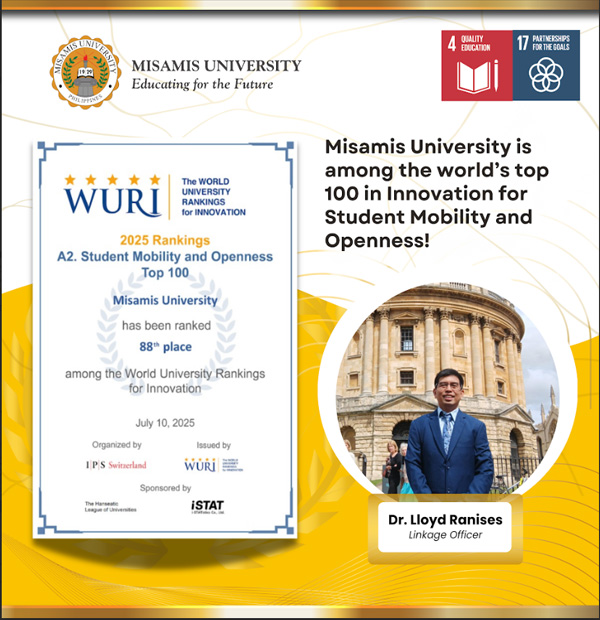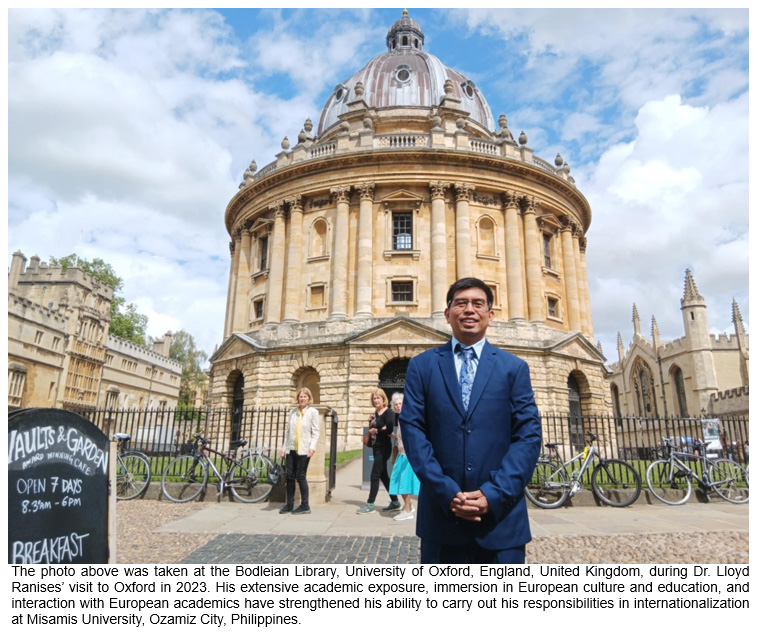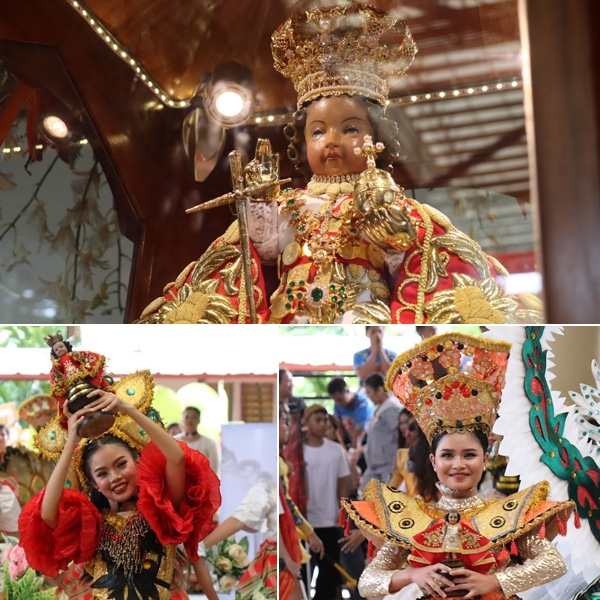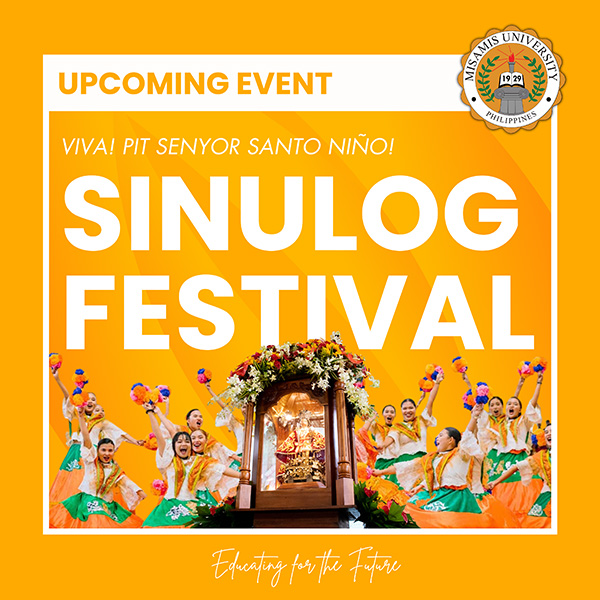
Misamis University Ranks 88th in WURI 2025 for Student Mobility and Openness
Misamis University has been ranked 88th in the A2: Student Mobility and Openness category in the 2025 World University Ranking for Innovation (WURI). Dr. Lloyd B. Ranises, Linkage Officer, penned the case submitted for this category, focusing on the mobility of MU personnel and students, both locally and internationally, as part of the University's linkage and internationalization initiatives. The entry, titled “From Online and Hybrid to Cross-Border Mobility: Mixed Methods for a Beginner University in Internationalization,” was submitted to WURI on January 15, 2025, as Misamis University's official application under the A2 category for the 2025 rankings, enhancing best practices in student mobility both for local and international arena.
This initiative aims to increase the University's visibility among stakeholders worldwide, in line with its vision: “Misamis University envisions to be a globally-recognized institution of learning.”
In the A2 category case, Dr. Ranises argued that Misamis University's internationalization efforts were in their early stages, primarily focused on local industries, a few Philippine HEIs, and only two HEIs from India in 2020. The geographic distance from India limited the outcomes of these partnerships. Due to restricted mobility, activities were confined mainly to local internships and benchmarking. International engagements were minimal, limited to a few participations in conferences prior to 2023, and lacked alignment with the University's strategic plans, resulting in incoherent outcomes. During this period, the Linkage Officer also faced overlapping responsibilities, which further hindered the effectiveness of mobility initiatives.
With the appointment of a new Linkage Officer in August 2023, the linkage initiatives shifted strategy toward building collaborations with nearby Southeast Asian HEIs to increase output, taking advantage of their geographic proximity. While actively pursuing international partnerships in the region, the initiatives also focused on maintaining strong local partnerships.
To carry this out effectively, the new officer strategically developed a mixed-method approach that combined online, hybrid, and onsite international engagements, including lectures, joint classes, forums, and conferences. This approach engaged the entire University community, giving deans, program heads, faculty, staff, and students the opportunity to actively participate. It proved to be highly cost-effective, requiring only minimal preparation and resources.
Thus, this mixed-method strategy, an innovation introduced by the Linkage Office, offers maximum benefits at minimal cost. It has proven to be strategically valuable to the University community.

Smooth coordination with deans and program coordinators was established to ensure that activities were aligned with the specific needs of their colleges and departments, with appropriate and timely scheduling. In implementing the plan, the lectures and forums covered a wide range of topics, including AI-assisted teaching methods, cultural psychology in Psychology lectures, trade relations in the Southeast Asian region in Business joint classes, sustainable practices in Engineering, and the preservation of natural resources in Tourism, alongside outbound mobility engagements of MU faculty members, all carried out through collaborations with VIT Bhopal University in India, the University of Jayewardenepura in Sri Lanka, Beijing Phihua International Education Technology Co. Ltd. in Chongqing, China, Universitas Persada Indonesia Y.A.I. in Indonesia, INTI International University in Malaysia, and Kasetsart University in Thailand.
From October 2023 to November 2024, the University held a total of 25 linkage activities, which include nine (9) online international lectures and classes; three (3) online and hybrid international conferences; two (2) internationalization fora; two (2) global-related capacity-building seminars; three (3) cross-border (inbound and outbound) mobility activities; and five (5) local mobility activities.
The multiple and varied forms of mobility over the year allowed a large number of students and faculty to participate in both local and international activities. At the same time, the Linkage Officer strengthened collaborations with local industries to enhance student internships and pursued additional partnerships with HEIs, industries, companies, and NGOs, both locally and internationally, to further develop and support the new system.
Based on survey evaluations, these activities showed that students were able to build rapport and improve cooperation and communication with international peers online. They gained new knowledge, enhanced their communication skills, and became more flexible and adaptive. They also became more familiar with the 17 United Nations Sustainable Development Goals (UN SDGs) at an international level. Students consistently expressed joy and enthusiasm each time they participated in international activities.
Additionally, faculty members had the opportunity to enhance and integrate new knowledge into their classes, establish connections with foreign professors, and improve cultural sensitivity. Participating in international activities encouraged them to take pride in sharing insights with international audiences.
Ultimately, the administration gained confidence from the students' strong performance in international activities. This allowed them to revisit institutional priorities based on the outcomes, with the goal of sustaining partnerships through continued collaboration. They also began exploring AI applications to assess how beneficial these could be when integrated into administrative systems.
Monetary benefits were also evident, including honoraria for MU faculty members who facilitated the events. The honoraria provided to active faculty who took on facilitation roles.
While engaging mixed methods, Dr. Ranises is strengthening employability both within the Philippines and as far as Europe, particularly for high-demand programs such as Paramedical courses, IT, and Engineering, with ongoing communication being maintained with potential partners in Europe and other First World countries.
These efforts have increased public awareness of the University's social responsibility toward the local community. Overall, they contribute to the realization of CHED Memorandum Order No. 55, Series of 2016, titled “Policy Framework and Strategies on the Internationalization of Philippine Higher Education,” which aims to support the socio-economic development of the country by producing productive citizens.
Additionally, this approach helps instill values that address broader global issues, shaping graduates into responsible global citizens.
The mixed-method strategy has helped the University's programs gradually build an understanding of global standards and move toward meeting them, while simultaneously deepening their awareness of industry needs both locally and internationally. Through ongoing online engagements, the University continues to fulfill its mission: “Misamis University envisions to be a globally-recognized institution of learning.”
This innovation shall be stabilized and sustained. Dr. Ranises foresees that once it is fully sustained, it will attract international students and faculty members from partner institutions and other countries to come to Misamis University to study, teach, and collaborate, helping establish an institution as a truly global university.
Announcement

|

|

|
Photo Gallery
 MU Sinulog Celebration 2026
MU Sinulog Celebration 2026
|
 MU Winter WonderLand Christmas Party 2025
MU Winter WonderLand Christmas Party 2025
|
 2025 Cheerdance Competition
2025 Cheerdance Competition
|
Videos

|

|

|















